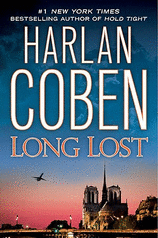Cameron Martin interviewed Laila Lalami for the Barnes & Noble Review. One of their exchanges:
BN Review: You grew up in Morocco, where French, Arabic and English are all commonly spoken. You've said that when you first  started writing, it was in French. Would you share with us the various reading and writing influences you encountered at an early age, in Arabic, French and English, respectively?
started writing, it was in French. Would you share with us the various reading and writing influences you encountered at an early age, in Arabic, French and English, respectively?
Laila Lalami: I grew up speaking both Arabic and French, but my earliest exposure to books came through French because I received, to my long-lasting despair, a semi-colonial education. In addition, most of the children's books that were available in my hometown in the 1970s were in French. As a child, I read Jules Verne, Alexandre Dumas and Georges Bayard, and so naturally when I started writing, it was in French. While I could read and write Arabic competently enough, I found it very hard to write fictional narrative in Arabic. It wasn't until I became a teenager that I really became exposed to the work of Moroccan and Arab writers. My favorites were Leila Abouzeid, Mohammed Choukri, Naguib Mahfouz, and later Tayeb Salih and Alifa Rifaat.
I started learning English at the age of 15, in high school, and later I majored in English in college. Being immersed in a new language gave me a new vantage point from which to observe the bilingualism with which I had grown up. It struck me that French and Arabic did not have a harmonious relationship in Morocco; they were always in competition and in conflict for space. For example, one's fluency in French was used as a major determinant of social class. I started to feel really uncomfortable with the idea of writing fiction in French and in fact I stopped writing for a while. When I moved to Los Angeles to go to graduate school, I decided to try my hand at writing fiction in English. I always find it hard to pinpoint specific literary influences, but the English-language writers I have always admired include J.M. Coetzee, Joseph Conrad, Margaret Atwood, Chinua Achebe, Vladimir Nabokov, among many others.[read on]
French and Arabic did not have a harmonious relationship in Morocco; they were always in competition and in conflict for space. For example, one's fluency in French was used as a major determinant of social class. I started to feel really uncomfortable with the idea of writing fiction in French and in fact I stopped writing for a while. When I moved to Los Angeles to go to graduate school, I decided to try my hand at writing fiction in English. I always find it hard to pinpoint specific literary influences, but the English-language writers I have always admired include J.M. Coetzee, Joseph Conrad, Margaret Atwood, Chinua Achebe, Vladimir Nabokov, among many others.[read on]
Laila Lalami was born and raised in Morocco. Her work has appeared in the
Los Angeles Times, the
Nation, the
New York Times, the
Washington Post, and elsewhere. She is the recipient of a Fulbright fellowship and was short-listed for the Caine Prize for African Writing in 2006. Her debut collection of short stories,
Hope and Other Dangerous Pursuits, was published in the fall of 2005 and has since been translated into Spanish, Dutch, French, Portuguese, Italian, and Norwegian.
Secret Son is her first novel
.
The Page 69 Test: Secret Son.
--Marshal Zeringue
are also procedurals—that is I follow and research what the police would actually do in these situations. So what I write is a combination of sub-genres. THE ODDS is, like the others, a merger of thriller and procedural. There are some very bad guys in it. And threat. And darkness. I like dark, tough stories.







































